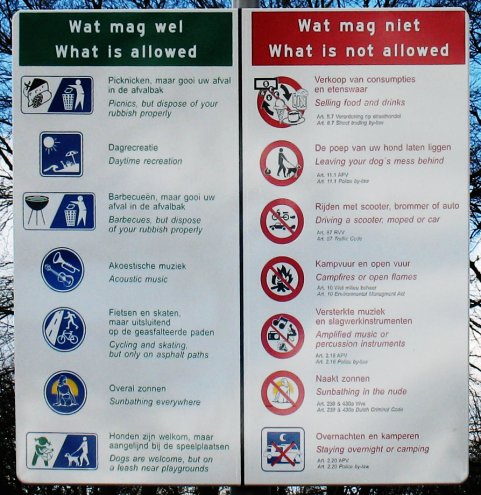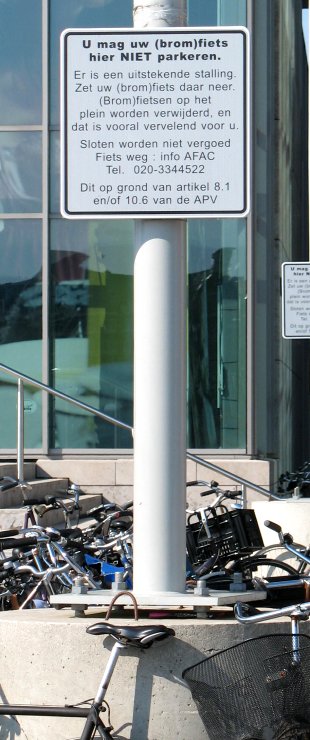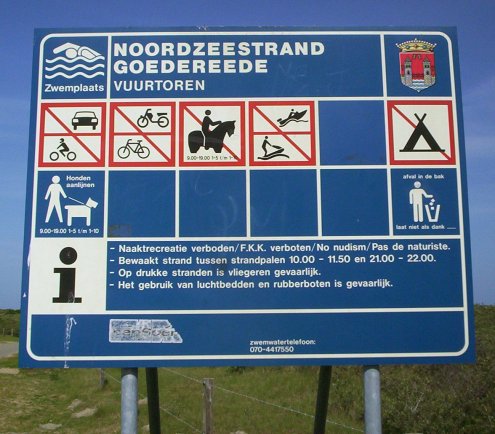“Thou shalt not” in Amsterdam
The past few weeks I came across these prohibitory signs in Amsterdam.

More and more people seem to think that anything that is not explicitly allowed (by whatever nebulous authority) must therefore be forbidden. This sign posted at the entrance of the Vondelpark in Amsterdam seems to pander to that strange sentiment. It starts with a list of things you are allowed to do. Now I can imagine that people wonder about barbecuing—open fires can be dangerous, and assuming that they are forbidden is not much of a stretch. But “acoustic music” and “daytime recreation”? Why, thank you mysterious authority!
That’s not the whole story though. The rules and regulations of this particular park became international news a month or so ago when they were reviewed by the local council. Patrons were interviewed to find out what kind of behaviours they liked and disliked, and it turned out that people hate free-roaming dogs, but don’t mind gays cruising the Rosarium and consuming their short-lived relationships in situ. The latter had of course always been tolerated in grand Dutch tradition. A little task for our readers: add a line to the sign displayed above that allows for steaming hot gay sex, but forbids tepid mushy straight sex. The winner will receive my heart-felt compliments.

Asking patrons what they like and grand Dutch traditions are almost certainly not what was on the minds of the architects behind the new central public library of Amsterdam. An imposing building at a grand square with steps leading up to the majestic entrance, the obligatory ramp for the wheelchair-bound worked away behind a broad pillar. You cannot have people use such a space any way they like. Somehow, the architects managed to realize that the Dutch won’t give up their bikes though, and designed an underground parking garage for bicycles. They originally limited signage to a parking sign for cars with a drawing of a bike beneath it, neatly out of the way from the square itself.
And then they had to plaster the entire square with these huge signs that point out that there is an underground parking somewhere. Amsterdammers like to bike right up to the entrance, and park within only a few meters distance of the building where they need to be. “There is an excellent parking,” the sign starts. Why not go the whole hog and begin the sign with “there is an excellent sign somewhere near here that points to the excellent parking”? Oh, the snarkiness of these signs: “Bikes will be removed from the square, and that’s an annoyance mostly for you.”
None of these problems would occur with the old library, which had no delusions of grandeur, was cramped or cosy depending on your point of view, and had bike racks no more than a few feet away from its tiny front door.

This final sign comes from the town of Goedereede on the island of Goeree-Overflakkee near Rotterdam. Not really mine, and not really “in Amsterdam,” but I felt it deserved a mention nevertheless. The good people of “Good Harbour” had the foresight to leave room for at least five more prohibitions. Last photo by David van der Mark, distributed under a Creative Commons Attribution-Share Alike 2.0 Generic license.

I have to admit, I have mixed feelings about that library sign. Snarky, yes, but at least it appears to have been written by a human bureaucrat, instead of just … “THEM.”
Something I’ve always wondered: I heard once that the Vondelpark had been established by the wealthy people who live in that part of town. As I heard the story, they gave their private garden to the city to create a public park, on one condition: that no one would ever create a law forcing dogs to be leashed in the park.
Waar of broodje aap?
-Toby
According to hetvondelpark.net, Vondelpark was sold “in 1953 voor het bedrag van 1 gulden aan de gemeente Amsterdam […], op voorwaarde dat het zijn bestemming zal houden, de muziekuitvoeringen worden gecontinueerd, fietsers (behalve op zondagmiddag) en ruiters het park mogen blijven gebruiken, honden los mogen lopen, en er geen politieke redevoeringen en collecten zullen worden gehouden” (in 1953 to the city of Amsterdam for the sum of one guilder on the condition that it would keep its purpose, that the concerts would be continued, that bicyclists and horse riders could keep using the park (except on Sunday afternoon), that dogs would be allowed to roam free, and that no political speeches and collections would be allowed).
Doesn’t the Goedereede sign leave room for 1 prohibition and 4…um…permissibles/orders? Maybe not. My grasp of Nederlander psychology is tenuous.
The permissibles are: you are allowed to leash your dog, and you are allowed to throw garbage in the designated cans. I’m sure any extra prohibitions can be reworded as permissions (“you are allowed to keep your clothes on at the beach”).
But hey, I was just being facetious. Of course the second row is for permissibles.